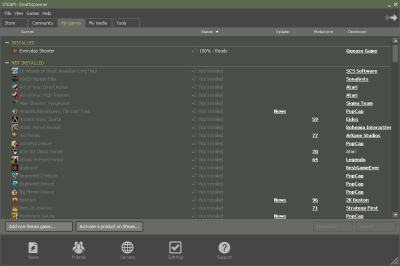- Qualcomm Launches Snapdragon 4 Gen 2 Mobile Platform
- AMD Launches Ryzen PRO 7000 Series Mobile & Desktop Platform
- Intel Launches Sleek Single-Slot Arc Pro A60 Workstation Graphics Card
- NVIDIA Announces Latest Ada Lovelace Additions: GeForce RTX 4060 Ti & RTX 4060
- Maxon Redshift With AMD Radeon GPU Rendering Support Now Available
Windows 7 Gains Ground on Steam’s Hardware Survey
It’s been a while since I launch took a look at Steam’s hardware survey results, but in recent weeks, I’ve been told by more than one person that I need to get on it, so here we are. The reason I was pushed towards checking it out is because a lot has changed in the gaming landscape over the course of the past few months, and believe it or not, Windows 7 is looking good in overall usage.
As no surprise to anyone, I’m sure, Windows XP is still the dominant version, with a 44.77% overall share, with Windows Vista (32-bit) coming in second with 20.71%. Windows 7 is growing, though, and currently sits at 15.61%, which is rather substantial when you consider that the OS just came out towards the end of October, and this survey is for anyone who runs Steam and has taken part. Also interesting is that this is with the 64-bit version… the 32-bit version accounts for 7.45%, for a combined share of 23.06%.
Operating systems aside, Valve’s survey also found that the quad-core trend has also been growing, with a 13.31% increase in adoption over the past 18 months. To be honest, I would’ve expected that number to be a bit higher, but it’s understandable since many people don’t upgrade quite so often, especially not the majority. Currently, Intel holds 68.97% of the current CPU share, with AMD in second with the remainder of 31.03%.
The most common DirectX 10 GPU for users who can take advantage of it (Vista/7) is the HD 4800 series from ATI. But those running DirectX 10 GPUs without the ability to take full advantage is even more common, with NVIDIA’s GeForce 8800 accounting for 13.64%. But, again, the HD 4800 doesn’t fall too far behind, with 12.88%. Overall, all of these results are quite interesting, especially with Windows 7. It’s just too bad that so many people are still sticking with the 32-bit version in lieu of x64!

Every few months we run a hardware survey on Steam. If you participate, the survey collects data about what kinds of computer hardware and system software you’re using, and the results get sent to Steam. The survey is incredibly helpful for us as game developers in that it ensures that we’re making good decisions about what kinds of technology investments to make, and also gives people a way to compare their own current hardware setup to that of the community as a whole.
| Source: Steam Powered Survey Results |
Discuss: Comment Thread
|




